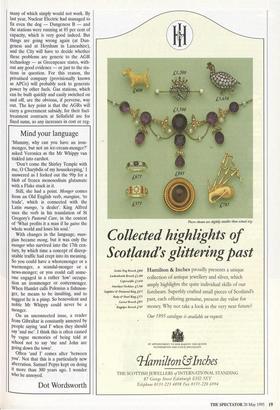Mind your language
`Mummy, why can you have an iron- monger, but not an ice-cream-monger?' asked Veronica as the Mr Whippy van tinkled into earshot.
`Don't come the Shirley Temple with me, 0 Charybdis of my housekeeping,' I answered as I forked out the 99p for a blob of frozen monosodium glutamate with a Flake stuck in it.
Still, she had a point. Monger comes from an Old English verb, mangian, 'to trade', which is connected with the Latin mango, 'a dealer'. King Alfred uses the verb in his translation of St Gregory's Pastoral Care, in the context of 'What profits it a man if he gains the whole world and loses his soul.'
With changes in the language, man- gian became mong, but it was only the monger who survived into the 17th cen- tury, by which time a concept of disrep- utable traffic had crept into its meaning. So you could have a whoremonger or a warmonger, a scandal-monger or a news-monger; or you could call some- one engaged in a rather 'low' occupa- tion an ironmonger or costermonger. When Hamlet calls Polonius a fishmon- ger, he means to be insulting, and to suggest he is a pimp. So benevolent and noble Mr Whippy could never be a monger.
On an unconnected issue, a reader from Gibraltar is constantly annoyed by people saying 'and I' when they should say 'and me'. I think this is often caused by vague memories of being told at school not to say 'me and John are going down the town'.
Often 'and I' comes after 'between you'. Not that this is a particularly new aberration. Samuel Pepys kept on doing it more than 300 years ago. I wonder who he annoyed.
Dot Wordsworth


































































 Previous page
Previous page